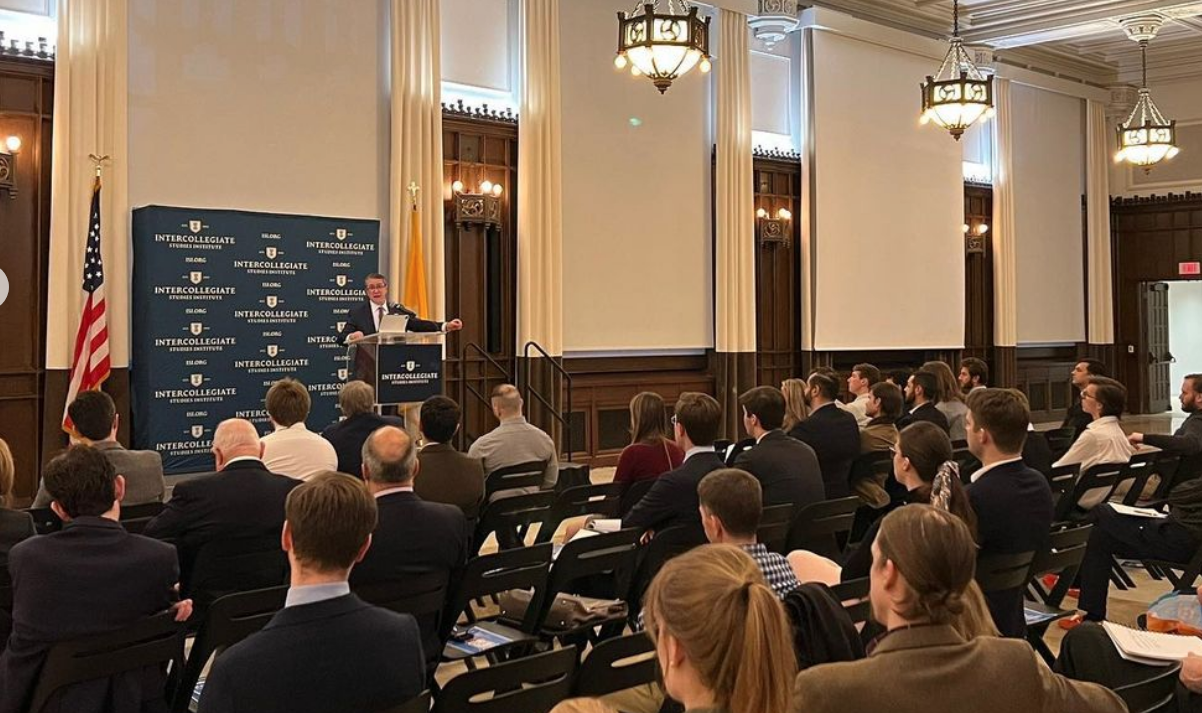Among the Young ‘Postliberals’
State of the Union: The desire for “regime change” was evident at the Catholic University of America.

On March 7, Patrick Deneen gave a talk entitled “Our Postliberal Future” to a sizable crowd gathered at the Catholic University of America. The event was organized by the American Postliberal with the help of the Intercollegiate Studies Institute and the Institute for Religion, Politics, and Culture at Washington College.
Deneen, a professor of political science at the University of Notre Dame and contributing editor of The American Conservative, has gained notoriety in political circles for his ideas challenging modern-day liberalism and the consequences it has wrought on society. He has written about “postliberalism” in his books, Why Liberalism Failed and, most recently, Regime Change: Toward a Postliberal Future.
Questioning liberalism and its typical tenets (liberty, equality, individuality) can cause quite the stir—Deneen opened up his talk by recalling how his lecture was supposed to be given at Washington College, but, due to his “cancellation” by the student body there, the presentation moved to CUA instead. (Officials, including the director of the Institute for Religion, Politics, and Culture, from Washington College wrote to The American Conservative to clarify that the event was never on the books, and so had not been cancelled by the school.)
Deneen spoke to how liberalism has instilled in modern people a destructive level of individuality, causing them to place more stock in material gain than in out-of-style institutions like marriage, religion, and communities. Deneen said, “So, if there’s going to be a regime change, or, rather, a regime reversal, we have to actively think about a governing philosophy that will seek to repair, especially on behalf of the people least well-off, the conditions of attachment.”
While Deneen’s discussion was indeed an enlightening crash course on postliberalism, what was arguably more interesting was how young the crowd gathered in CUA’s O'Connell Hall was. Students and young adults from all over D.C., not just CUA, came to hear what Deneen had to say about America’s postliberal future. It seemed that every person in the room had their hands raised to ask a question by the lecture’s end, and Deneen was mobbed like a pop star afterwards.
But how popular is postliberalism really on the American right? Some conservatives are actively seeking to give the postliberal cause its own niche within the conservative movement in order to affect change. William Benson, a CUA student and editor-in-chief of the American Postliberal, told The American Conservative, “We started the American Postliberal to do just that. While we are still a young publication, we are in this fight for the long haul, and will continue to connect students across the country who will take these principles out of the classroom and into the halls of government.”
Another CUA student, Joey Shagoury, spoke directly about postliberalism’s appeal to younger Americans: “Youth in general are dissatisfied with the political consensus. Ideas that are non-traditional have quickly become fashionable, both on the left and right…. There is something of great interest going on with this movement and other new intellectual movements across the country.”
Subscribe Today
Get daily emails in your inbox
In their review of Regime Change last year, the Jacobin called “conservative postliberalism” “little more than reactionary nonsense dressed up in populist rhetoric.” But is postliberalism a movement exclusively for the “fringe” political right?
That did not seem to be the case at CUA, where “classical liberals” and even self-proclaimed “leftists” were in attendance. One audience member asked Deneen about the place anti-capitalism has within the postliberal framework; Deneen welcomed the question and decried the capitalistic greed of our current elites.
The postliberals in attendance at Deneen’s talk remain optimistic about a postliberal American future and its slow shift into the mainstream. Benson said, “Postliberalism is the preeminent ‘philosophy’ among conservative youth because we recognize that the liberal order is coming to an end, whether anyone likes it or not.” He continued, “We need a public philosophy that is definitively conservative and presents a positive vision of the future, one built on the common good and human flourishing.”